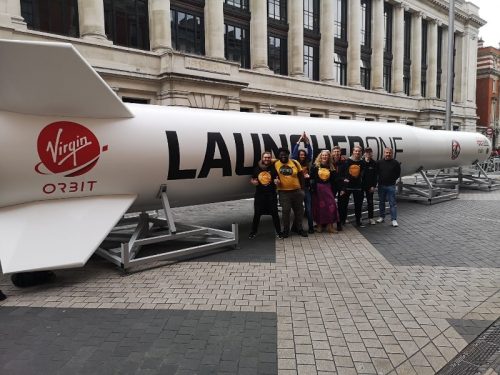University launches Spaceport VR experience

Students at Falmouth University have developed a virtual reality experience which enables users to enjoy a virtual journey through the facilities at Spaceport Cornwall and witness the first horizontal launch from the UK up close.
Interacting with key figures in UK space, including British Astronaut, Tim Peake; Melissa Quinn, head of Spaceport Cornwall for the first launch; and Flight Lieutenant Matthew “Stanny” Stannard, who was tasked with flying the converted Boeing 747 with the LauncherOne rocket attached.
The UK Space Agency provided £10,000 to support the development of Falmouth University’s VR experience with a view to help inspire and engage the next generation of space professionals and help sustain the future talent pipeline.
The project came together under the guidance of project lead, Brian Waterfield, and the support of Naomi Johns.
Contributors to the development of the VR include: 3D Artists, Elmo La Mantia, Tamsin Page, Lewis Knowles, Daniel Trueman, Alfie Hamblin and Sam Fereday; Programmers Tega Amrore, Alex Hristov, Hayley Davies and Zachariah Thomson; Animator, Joe Liggi; and Designers, Bogo Petrov, Ethan Baldwin and Jack Myrick.
The VR experience is live and accessible on the Meta website and, as well as being able to download at home, the public will be able to access the content by visiting any of the ten locations included in the UK Space Agency’s ‘Space for Everyone’ tour.
Brian Waterfield, head of immersive production, Falmouth University, said: “Through the power of collaboration, this talented team managed to capture the true essence of the launch, weaving a captivating narrative that resonates with users. The educational experience developed by this exceptional team stands as a testament to their collective creativity, dedication, and expertise.”
Ian Annett, deputy CEO at the UK Space Agency, said: “Falmouth University’s virtual reality experience is an exciting resource for young people engaging with the Space for Everyone tour, giving them a chance to learn about the UK’s work in space in a new and exciting way. The UK Space Agency provided £10,000 to the project, which is an excellent example of how we need more than astrophysicists to build a thriving space sector. We also need artists, designers, educators and much more. There are opportunities for everyone, of all backgrounds and skills, to become space professionals and help sustain our future talent pipeline.”









